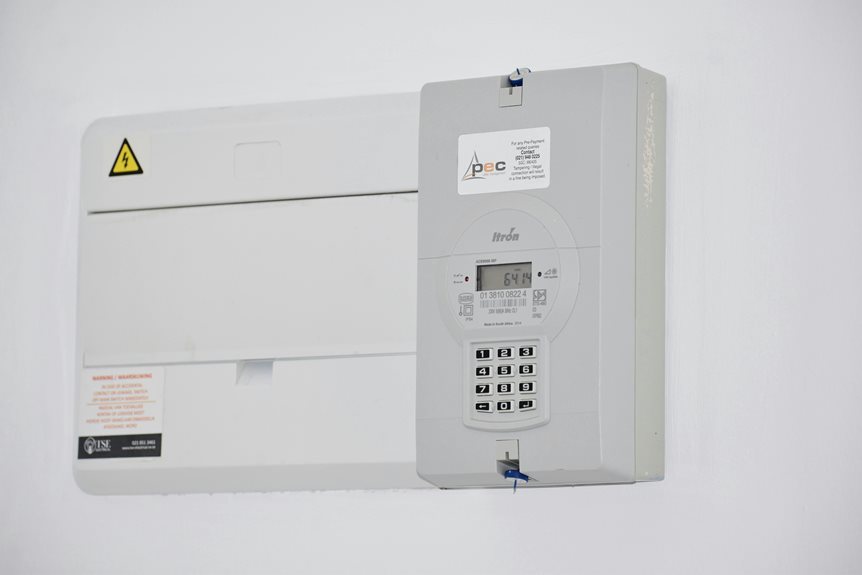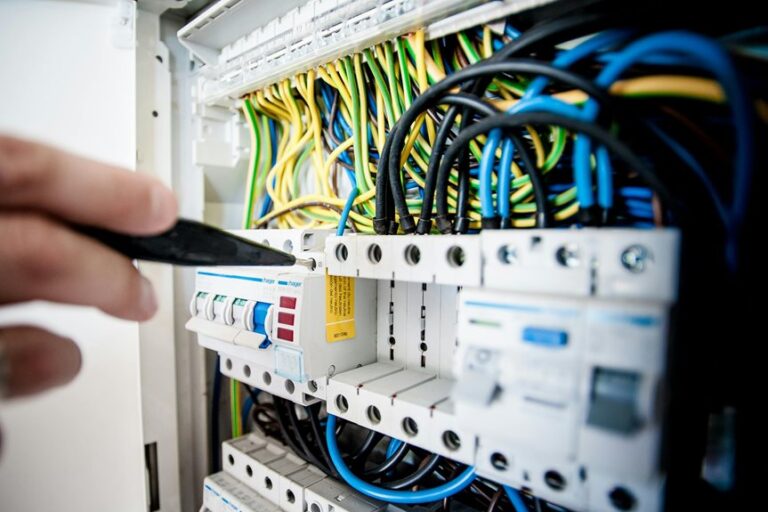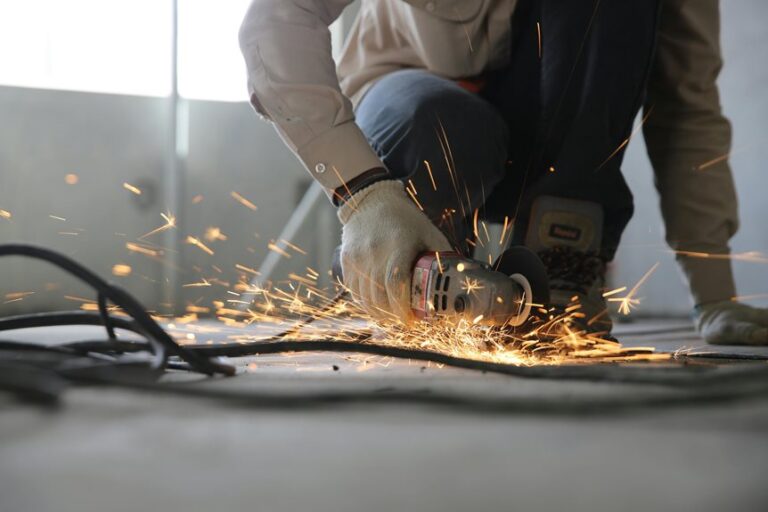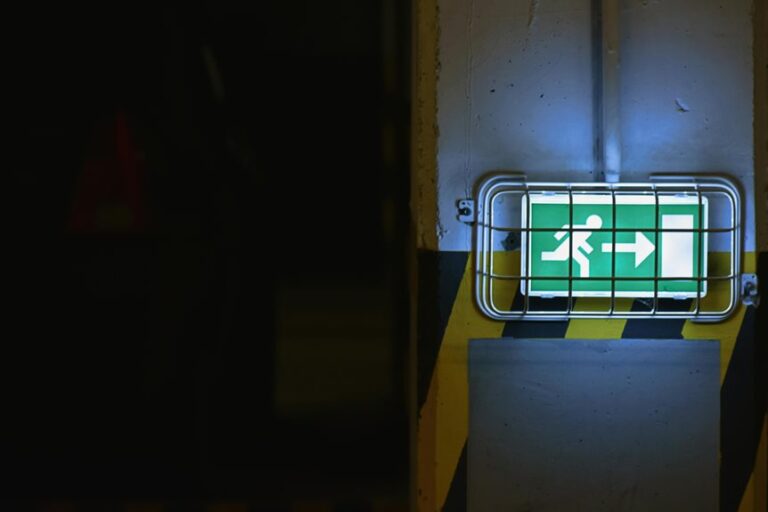Just as a sturdy dam regulates water flow, an upgraded electrical fuse box manages your home's power supply more effectively. If you're experiencing frequent blown fuses or irregular power delivery, it's time to assess your system's capacity and safety standards. Modern households demand more energy, and an outdated fuse box can lead to serious hazards. Knowing when to upgrade and understanding the types available can greatly impact your home's electrical performance. What factors should you consider before making this important decision?
Signs You Need an Upgrade
Recognizing the signs that you need an electrical fuse box upgrade is vital for maintaining safety and efficiency in your home.
One clear indication is frequent blown fuses or tripped breakers. If you're constantly resetting the system, it's a strong sign that your current setup can't handle your electrical load. Additionally, if your fuse box is more than 20 years old, it likely lacks the capacity to meet modern demands, necessitating an upgrade.
Another warning sign is the presence of rust or corrosion on the fuse box or its components. This deterioration can compromise functionality and pose a fire risk.
You should also be cautious if you notice flickering lights or inconsistent power supply, as these issues can indicate an overloaded or failing system.
If you're planning to add new appliances or expand your electrical needs, an outdated fuse box may not provide sufficient power.
Finally, if you hear buzzing sounds or smell unusual odors coming from the box, it's imperative to address these symptoms immediately, as they can signal dangerous conditions.
If you notice any of these signs, consider consulting a licensed electrician for an assessment.
Benefits of Upgrading
Upgrading your electrical fuse box offers several significant benefits that enhance your home's safety and efficiency.
You'll gain improved safety features that protect against electrical hazards, increased capacity to handle modern appliances, and optimized performance for your devices.
These upgrades not only guarantee your electrical system meets current standards but also provide peace of mind.
Enhanced Safety Features
Electrical safety is paramount in any home, and upgrading your fuse box greatly improves this critical aspect.
Modern fuse boxes come equipped with advanced safety features that considerably reduce the risk of electrical hazards. One of these features is the integration of circuit breakers, which automatically disconnect power when an overload or short circuit occurs. This prevents potential fires and equipment damage.
Additionally, upgraded fuse boxes often include Ground Fault Circuit Interrupters (GFCIs) and Residual Current Devices (RCDs). These devices detect imbalances in electrical currents and shut off power to prevent electrocution, especially in wet areas like bathrooms and kitchens.
With improved surge protection, you'll also safeguard your appliances from voltage spikes caused by external factors, such as lightning strikes or utility issues.
Furthermore, an upgraded fuse box allows for better wire insulation and more effective grounding systems. This reduces the likelihood of electrical shocks and guarantees that your home's electrical system operates efficiently.
Increased Electrical Capacity
Many homeowners find that an upgraded fuse box greatly boosts their electrical capacity, allowing for increased power demands from modern appliances and technology. As your household grows or as you invest in more power-hungry devices, an outdated fuse box might struggle to keep up, leading to frequent tripping or even potential hazards.
Benefits of Increased Electrical Capacity
| Benefit | Description | Example Applications |
|---|---|---|
| Higher Amperage Ratings | Supports modern electrical loads | HVAC systems, electric vehicles |
| Additional Circuits | Allows for more devices without overload | Home offices, entertainment systems |
| Future-Proofing | Prepares for upcoming technology trends | Smart home devices, EV chargers |
| Enhanced Reliability | Reduces risk of electrical failures | Consistent power for appliances |
Improved Appliance Performance
When you upgrade to a modern fuse box, you'll notice a significant enhancement in your appliances' performance. Older fuse boxes often struggle to meet the energy demands of contemporary devices. By switching to a new system, you provide your appliances with a reliable and consistent power supply, reducing the risk of inefficient operation or damage.
Modern fuse boxes are designed to handle higher loads, allowing multiple appliances to run simultaneously without tripping circuits. This is particularly important for power-hungry devices like refrigerators, washing machines, and HVAC systems.
Improved wiring and circuit design also minimize voltage drops, ensuring that your appliances receive the ideal voltage they require for peak performance.
With enhanced safety features, such as circuit breakers that respond to overloads and short circuits, you can prevent potential damage to your appliances. This not only prolongs their lifespan but also enhances energy efficiency, resulting in lower utility bills.
Types of Fuse Boxes
Throughout the evolution of home electrical systems, various types of fuse boxes have emerged to meet different safety and operational needs.
You'll encounter two primary types: the traditional fuse box and the modern circuit breaker panel.
Traditional fuse boxes utilize fuses that contain a metal wire. When an overload occurs, the wire melts, breaking the circuit. While effective, these fuses require manual replacement after they blow, which can be inconvenient and may lead to safety hazards if not replaced correctly.
On the other hand, circuit breaker panels have gained popularity due to their resettable switches. When a circuit overload happens, the breaker trips, cutting off the current. You can simply reset the breaker after addressing the issue, eliminating the need for replacement parts.
In addition, some homes feature subpanels, which serve specific areas or high-demand appliances.
Understanding these types allows you to make informed decisions about upgrades or replacements, ensuring your electrical system remains safe and efficient.
As you consider your options, think about your household's power needs and the benefits each type provides.
Understanding Electrical Capacity
Understanding electrical capacity is essential for ensuring your home's safety and efficiency.
If your system is overloaded, you might notice signs like tripped breakers or flickering lights, indicating it can't handle the demand.
Recognizing these issues early can prevent costly damage and enhance your electrical system's performance.
Importance of Electrical Capacity
Evaluating electrical capacity is essential for ensuring your home's safety and efficiency. It's vital to know how much power your electrical system can handle. Insufficient capacity can lead to circuit overloads, which may cause equipment failure or even electrical fires.
Understanding your electrical capacity helps you make informed decisions about upgrades and additions. Here's a simplified breakdown of typical household electrical capacity:
| Capacity (Amps) | Common Uses |
|---|---|
| 100 Amps | Basic household needs |
| 200 Amps | Modern homes, high-demand appliances |
| 400 Amps | Large homes, commercial applications |
When you're planning to upgrade your electrical system, consider your current and future energy needs. This evaluation allows you to determine if your fuse box needs an upgrade to accommodate new appliances or increased energy consumption. Always consult a licensed electrician to accurately assess your capacity and make necessary adjustments. Ensuring your electrical capacity meets your needs not only enhances safety but also improves the overall efficiency of your home.
Signs of Overloading Issues
If you're noticing frequent tripped circuit breakers or blown fuses, it's a clear sign your electrical system might be overloaded. This occurs when the demand for electricity exceeds the capacity of your wiring or circuit breakers. You may also observe flickering lights, especially when you use multiple appliances simultaneously. Such fluctuations indicate that your system struggles to handle the load.
Another sign is the presence of warm or hot outlets and switches. If these components feel unusually warm to the touch, it could suggest excessive current flow, which poses fire risks. Additionally, if you're using power strips or extension cords extensively, it further highlights that your existing electrical capacity isn't meeting your needs.
You might also notice a burning smell emanating from outlets or appliances, which should never be ignored. This can indicate overheating and potential failure of electrical components.
Finally, if you find yourself frequently resetting breakers or replacing fuses, it's time to evaluate your system's capacity. Addressing these issues promptly is essential for both safety and functionality, ensuring your home's electrical system operates efficiently and reliably.
Safety Considerations
Guaranteeing safety during an electrical fuse box upgrade is crucial for both your home and personal well-being. Before you start, there are several important safety considerations to keep in mind. Electrical systems can be dangerous if not handled properly, so taking precautions is essential.
- Turn Off Power: Always switch off the main power supply before beginning any work on your fuse box to avoid electrical shock.
- Use Proper Tools: Employ insulated tools specifically designed for electrical work, guaranteeing they meet safety standards.
- Follow Local Codes: Familiarize yourself with local electrical codes and regulations to guarantee your upgrade complies with safety standards.
Additionally, consider consulting a licensed electrician if you're unsure about any aspect of the upgrade. They possess the expertise to identify potential hazards and guarantee that the installation is safe.
For residents in San Bernardino, hiring top electricians can ensure quality work and adherence to safety standards.
Remember to wear protective gear, such as gloves and goggles, while working. By prioritizing these safety measures, you'll not only protect yourself but also create a safer environment for everyone in your home.
Always err on the side of caution; electrical work is best left to professionals when in doubt.
Cost of Upgrading
Upgrading your electrical fuse box can greatly enhance your home's safety and efficiency, but understanding the associated costs is vital before starting the project. The price of an upgrade varies based on several factors, including the type of fuse box, the complexity of the installation, and any additional electrical work needed.
Here's a breakdown of potential costs:
| Cost Factor | Estimated Cost Range | Notes |
|---|---|---|
| Fuse Box Replacement | $800 – $1,500 | Depends on amperage and brand |
| Labor Costs | $300 – $800 | Rates vary by location |
| Additional Upgrades | $100 – $500 | Includes wiring or outlet upgrades |
In total, you might be looking at a range between $1,200 and $2,800 for a complete upgrade. Keep in mind that unforeseen issues, like outdated wiring or code violations, can increase costs. It's important to budget for these potential extras. By planning ahead, you can guarantee a smooth upgrade process without financial surprises. Consulting with expert electricians can provide you with valuable insights and help ensure the upgrade meets local codes and safety standards.
Choosing the Right Professional
After evaluating the costs involved in upgrading your electrical fuse box, the next step is selecting the right professional for the job. Choosing a qualified electrician is essential, as they guarantee that your upgrade meets local codes and safety standards.
Here are some key points to take into account:
- Credentials and Licensing: Verify that the electrician holds the necessary licenses and certifications for electrical work in your area.
- Experience with Fuse Box Upgrades: Look for professionals with a proven track record in upgrading fuse boxes, as this specific experience can greatly impact the quality of the work.
- Insurance Coverage: Confirm that the electrician has liability insurance. This protects you from potential liabilities in case of accidents or damage during the installation.
Take the time to research and compare multiple professionals. Read reviews, check references, and request quotes to gauge their expertise and reliability. Additionally, consider seeking out local electricians in Upland who are familiar with the specific regulations and requirements in your area.
A well-chosen professional not only safeguards your home but also enhances the efficiency and safety of your electrical system. Investing in the right electrician will save you time, money, and potential hazards in the long run.
DIY vs. Professional Installation
When considering an electrical fuse box upgrade, you need to weigh the cost of DIY versus hiring a professional.
While DIY might seem cheaper, the safety risks and potential time investment could outweigh the initial savings.
Understanding these factors is vital for making an informed decision that guarantees both efficiency and safety.
Cost Considerations
Deciding between a DIY approach or hiring a professional for electrical fuse box upgrades involves careful consideration of costs and potential risks.
While tackling this project yourself might save money upfront, it's vital to factor in hidden expenses and the value of your time. Here are a few cost considerations to keep in mind:
- Material Costs: You'll need to purchase quality materials, which can add up quickly.
- Time Investment: Consider how long the project will take. Your time has value, too.
- Future Repairs: A poorly executed DIY job can lead to costly repairs down the line.
Hiring a professional typically incurs a higher initial cost, but their expertise can save you from potential mistakes.
Pros often provide warranties and peace of mind, knowing the job's done correctly.
If you're confident in your skills and understand the complexities involved, DIY might be the way to go.
However, if you're uncertain or lack experience, investing in a professional can ultimately save you money and hassle, ensuring the upgrade meets safety standards and performs efficiently.
Balancing these factors will guide you toward the right choice for your circumstances.
Safety Risks
Many homeowners underestimate the safety risks associated with electrical fuse box upgrades, especially when considering a DIY approach. While it might seem like a cost-effective solution, the complexities of electrical systems demand expertise. Incorrect installations can lead to severe hazards like electrical fires, shocks, or even fatalities.
Here's a quick comparison of safety risks between DIY and professional installation:
| Aspect | DIY Installation |
|---|---|
| Knowledge Required | Limited electrical knowledge |
| Risk of Faults | High due to inexperience |
| Code Compliance | Often overlooked |
| Safety Equipment | May lack necessary tools |
| Liability | Entirely on the homeowner |
Choosing a professional guarantees adherence to safety standards and building codes. Licensed electricians have the training needed to identify potential hazards and implement corrective measures. They'll also guarantee that your system can handle modern electrical demands, reducing the chance of overloading. Ultimately, investing in professional installation is a smart choice that prioritizes your safety and peace of mind. Don't risk your home and family's well-being by going the DIY route without the necessary expertise.
Time Investment
Upgrading an electrical fuse box requires a considerable time commitment, whether you choose a DIY approach or hire a professional.
If you decide to tackle this project yourself, you'll need to allocate ample time for planning, purchasing materials, and executing the installation. This process can easily span several days, especially if you're unfamiliar with electrical systems.
On the other hand, hiring a professional can streamline the process, but you'll still need to dedicate time for consultations and scheduling the installation.
Here are some factors to take into account:
- Skill Level: Your familiarity with electrical work can affect how much time you'll spend on the project.
- Complexity of the System: Older homes might present unexpected challenges, increasing the time needed for upgrades.
- Permits and Inspections: Depending on your location, acquiring the necessary permits and scheduling inspections can greatly add to the timeline.
Ultimately, whether you go DIY or professional, expect the upgrade to be a time-intensive endeavor that demands careful planning and execution to guarantee safety and compliance with local codes.
Maintenance Tips After Upgrade
Regular maintenance of your upgraded electrical fuse box is essential to confirm its longevity and peak performance. Start by routinely inspecting your fuse box for any signs of corrosion, moisture, or damage.
Confirm the area around the box remains clear of debris and clutter to promote airflow and reduce fire risks.
Next, check the circuit breakers or fuses for proper operation. If you notice frequent tripping or blown fuses, it might indicate an underlying electrical issue that requires immediate attention.
Make sure all connections are tight and secure, as loose wiring can lead to overheating and potential hazards.
You should also keep an eye on your electrical load. Avoid overloading circuits by distributing electrical devices evenly across different breakers.
It's wise to consult with an electrician if you plan to add more appliances or equipment.
Finally, schedule professional inspections periodically. A qualified electrician can identify potential problems and confirm that your upgraded system complies with current codes and standards. Additionally, proper fuse box maintenance helps prevent costly repairs in the future.
Future-Proofing Your Electrical System
Future-proofing your electrical system is essential to accommodate evolving technology and increasing energy demands. As you upgrade your electrical fuse box, consider future enhancements that will guarantee your system remains reliable and efficient.
Here are key aspects to keep in mind:
- Higher amperage capacity: Opt for a fuse box that supports higher amperage, allowing for additional circuits and appliances without overloading the system.
- Smart technology integration: Incorporate smart home devices and energy management systems to optimize usage and monitor consumption in real-time.
- Surge protection: Install surge protectors to safeguard sensitive electronics from voltage spikes, protecting your investment and enhancing longevity. Additionally, consulting with expert electricians in Rancho Cucamonga can provide valuable insights into the best upgrades for your needs.
Conclusion
Upgrading your electrical fuse box isn't just a good idea; it's an essential step toward ensuring your home's safety and efficiency. With the right upgrades, you can tackle current power demands and future-proof your system against the tech explosion that's on the horizon. Don't risk your safety or comfort—investing in a professional installation can be as transformative as turning your old clunker into a sleek, high-performance electric vehicle. Get started today for peace of mind tomorrow!








